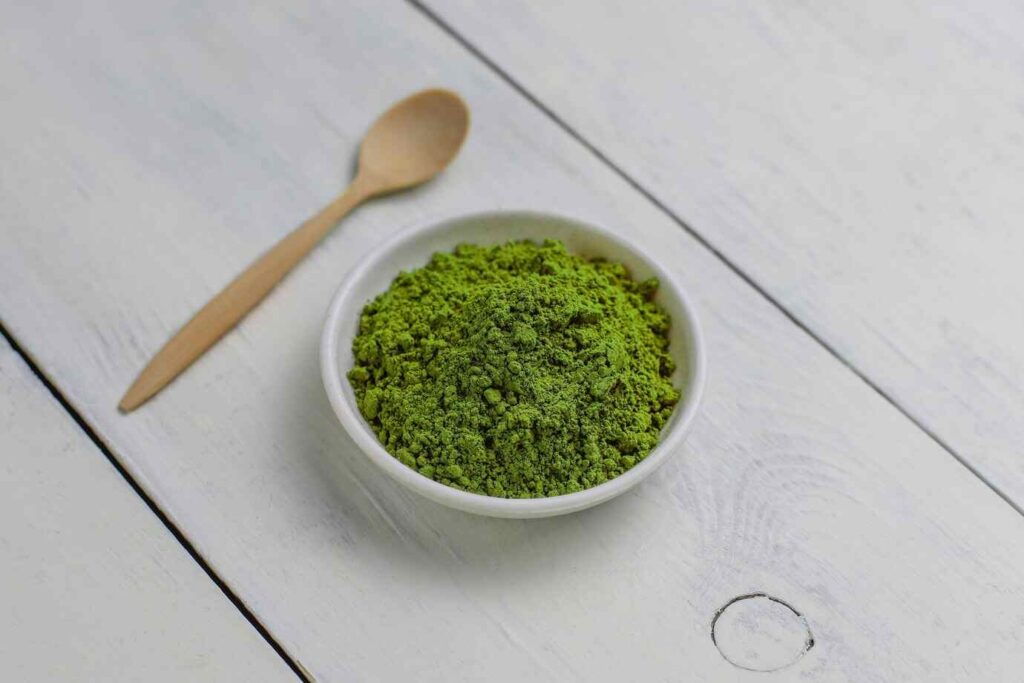Matcha is gaining popularity as a coffee alternative. It’s known for its steady, long-lasting energy. Unlike coffee, which can lead to crashes, matcha provides a calm focus. Packed with antioxidants, it also offers health benefits.
Coffee has always been a favorite for a morning pick-me-up. Many people still rely on it for quick energy. But the jittery side effects often make them look for alternatives.
This article compares matcha and coffee. We’ll look at their effects on energy, focus, and health. Is matcha a better choice, or does coffee still have the edge? Let’s find out in this matcha vs coffee debate.
Caffeine Content: Matcha vs Coffee
Coffee is known for its quick energy boost. A typical 8-ounce cup contains about 95 milligrams of caffeine. This provides fast-acting energy, making it a popular choice for those needing a morning pick-me-up. However, the effects of coffee can be intense, often followed by a crash, especially for those sensitive to caffeine.
Matcha, in contrast, contains less caffeine. One teaspoon of matcha powder provides around 35 milligrams of caffeine. While this is lower than coffee, the energy release is much slower. This gradual effect is due to L-theanine, an amino acid in matcha that promotes relaxation and focus.
The combination of caffeine and L-theanine in matcha offers a calm, steady energy. It enhances focus without the jittery feeling often associated with coffee. Matcha’s effects are smoother, and it supports sustained attention throughout the day without the sudden highs and lows.
Coffee, with its faster caffeine release, can result in energy spikes followed by crashes. While some prefer the quick boost, others may find matcha’s gradual, focused energy a better fit. Ultimately, the choice depends on whether you prefer an instant energy burst or a more balanced, sustained boost.
Energy and Mental Focus
Coffee gives a quick boost of energy, thanks to its high caffeine content. It helps with alertness but can also cause anxiety or jitteriness, especially for those sensitive to caffeine. This can make it harder to focus for some people.
Matcha, however, promotes steady, sustained focus. It contains L-theanine, an amino acid that calms the body and mind. This helps reduce anxiety while still providing a steady energy boost. The result is better focus and mental clarity without the jitters.
The choice between coffee and matcha depends on your caffeine sensitivity. Coffee might work for you if you need a fast burst of energy and aren’t prone to anxiety. However, if you feel jittery or anxious with coffee, matcha could offer a calmer, more balanced energy.
Both drinks offer benefits for productivity, but your personal experience with caffeine will determine the best choice for mental focus and concentration.

Health Benefits: Matcha vs Coffee
Antioxidants
Coffee: Coffee is rich in antioxidants, particularly chlorogenic acid, which has been linked to improved blood sugar control and anti-inflammatory effects. These antioxidants can help protect against oxidative stress and reduce the risk of chronic diseases.
Matcha: Matcha is packed with a unique antioxidant called EGCG (epigallocatechin gallate). EGCG is known for its powerful ability to fight free radicals and support cellular health. It has also been studied for its potential in preventing cancer and boosting metabolism.
Verdict: While both coffee and matcha are antioxidant-rich, matcha has the edge due to its higher concentration of EGCG, offering stronger anti-inflammatory and anti-cancer properties.
Heart Health
Coffee: Research shows that moderate coffee consumption may have a protective effect on heart health. It has been linked to a reduced risk of heart disease, thanks to its antioxidants and ability to improve blood vessel function. However, excessive coffee intake can raise blood pressure, which may be a concern for some individuals.
Matcha: Matcha also supports heart health, primarily due to the antioxidants in EGCG. Studies suggest that these compounds can help lower cholesterol levels and improve blood circulation, contributing to overall cardiovascular health.
Verdict: Both beverages have heart-health benefits, but matcha may offer a more balanced approach without the potential risks of elevated blood pressure from excessive coffee consumption.
Liver Support
Coffee: Drinking coffee in moderation has been shown to protect the liver from conditions like fatty liver disease and cirrhosis. The antioxidants in coffee can reduce inflammation in the liver, promoting better function.
Matcha: Matcha’s high concentration of antioxidants also supports liver health by promoting detoxification and reducing oxidative damage. EGCG in particular has been shown to protect liver cells from toxicity.
Verdict: Both coffee and matcha support liver health, but matcha’s additional antioxidant benefits give it a slight advantage in detoxifying and protecting the liver.
Blood Sugar Control
Coffee: Studies have shown that coffee can improve insulin sensitivity and help regulate blood sugar levels. The chlorogenic acids in coffee may also help reduce the risk of type 2 diabetes.
Matcha: Matcha has shown promise in improving blood sugar control as well. EGCG helps regulate insulin levels and promotes stable blood sugar, reducing the risk of insulin resistance.
Verdict: Both drinks have benefits for blood sugar control, but matcha’s EGCG may offer a more consistent effect on stabilizing blood sugar levels.
Weight Management
Coffee: Coffee is often touted as a weight-loss aid due to its ability to increase metabolism and fat oxidation. The caffeine in coffee stimulates thermogenesis, helping the body burn more calories.
Matcha: Matcha can also aid in weight management, with its combination of caffeine and EGCG. The antioxidants in matcha may help increase fat burning, while the calming effects of L-theanine reduce cravings.
Verdict: Both beverages can aid in weight management, but matcha’s combination of metabolism-boosting properties and calming effects may provide a more balanced approach for long-term weight control.
Side Effects and Tolerance
Coffee
Coffee offers many benefits but also comes with some downsides. The high caffeine content can lead to jitteriness. This may cause anxiety or restlessness, especially for those sensitive to caffeine. Coffee can also trigger acid reflux, increasing stomach acid production. Additionally, regular consumption can lead to caffeine dependence, causing withdrawal symptoms when intake is reduced.
Matcha
Matcha is generally gentler on the stomach than coffee. Its lower caffeine content, combined with L-theanine, helps reduce jitteriness. However, matcha still contains caffeine. Excessive consumption can lead to insomnia or nervousness, particularly for caffeine-sensitive individuals. Drinking too much matcha may also cause mild stomach irritation due to its concentrated nature.
Both coffee and matcha should be consumed in moderation. Coffee’s higher caffeine content and acidity can cause discomfort for some. Matcha is milder but still contains caffeine. Both drinks can cause overstimulation or digestive issues if consumed excessively, so it’s important to find a balance based on personal sensitivity.
Lifestyle Fit: Which One’s Right for You?
Choose Coffee If…
Coffee is your go-to if you need a quick burst of energy to kickstart your day. It’s perfect for those mornings when you need to wake up fast. If you love the rich, bold flavor and the immediate boost of alertness, coffee might be your best choice. It’s ideal for people who thrive on fast energy, like during busy mornings or work deadlines.
Choose Matcha If…
If you prefer steady, sustained energy without the jitters, matcha is the way to go. The calming effects of L-theanine paired with caffeine help you stay focused without feeling overly stimulated. Matcha is also packed with antioxidants and nutrients, supporting your health goals, especially if you’re looking to boost mental clarity, mindfulness, and overall wellness. It’s perfect for those who want long-lasting energy throughout the day.
Alternating or Combining Both
For some, alternating between coffee and matcha can offer the best of both worlds. Coffee can give you that fast energy boost when you need it, while matcha can keep you calm and focused during tasks that require sustained concentration. Combining the two can add variety to your routine and help you find a balance that works for your lifestyle and health goals.
Ultimately, your choice depends on your personal habits, taste, and how you want to feel throughout the day.
FAQs
Can I Replace Coffee with Matcha?
Yes, you can replace coffee with matcha if you’re looking for a steadier energy boost. Matcha provides caffeine but releases it more slowly, thanks to L-theanine. This means you’ll experience less of the jitteriness and crashes often associated with coffee. However, if you enjoy the strong flavor of coffee, matcha may take some getting used to.
Is Matcha Good for People with Anxiety?
Yes, matcha can be a good choice for those with anxiety. The calming effects of L-theanine help counteract the stimulating effects of caffeine, promoting focus without causing nervousness or jitteriness. Unlike coffee, matcha offers a more balanced energy boost, which may help reduce anxiety, especially for those sensitive to caffeine.
Can I Drink Both Matcha and Coffee in a Day?
Absolutely! Many people alternate between coffee and matcha to enjoy the benefits of both. Coffee can provide a quick energy boost in the morning, while matcha can help maintain focus and calm throughout the day. Just be mindful of your total caffeine intake to avoid overstimulation or digestive issues.
Which Is Better for Weight Loss: Matcha or Coffee?
Both matcha and coffee can aid in weight loss, but they work in different ways. Coffee increases metabolism and fat burning due to its caffeine content. Matcha also boosts metabolism but with the added benefit of EGCG, an antioxidant that may help with fat oxidation. If you’re looking for a more balanced, long-term solution, matcha might be the better choice due to its calming effects and nutrient content. However, coffee can still be effective for quick energy and fat burning.
Conclusion
Both matcha and coffee have their own unique benefits. Matcha offers calm, sustained energy thanks to its lower caffeine content and L-theanine. It’s also packed with antioxidants, making it a great choice for those looking for a balanced energy boost without the jitters.
Coffee, on the other hand, provides a quick hit of energy. It’s perfect for those who need to jumpstart their day or need a burst of focus. However, the fast energy from coffee can sometimes lead to crashes or jitteriness, especially for caffeine-sensitive individuals.
Ultimately, your choice depends on your personal needs. If you want steady energy and mindfulness, matcha is a great option. But if you need a rapid boost to power through the day, coffee may be the better choice.
